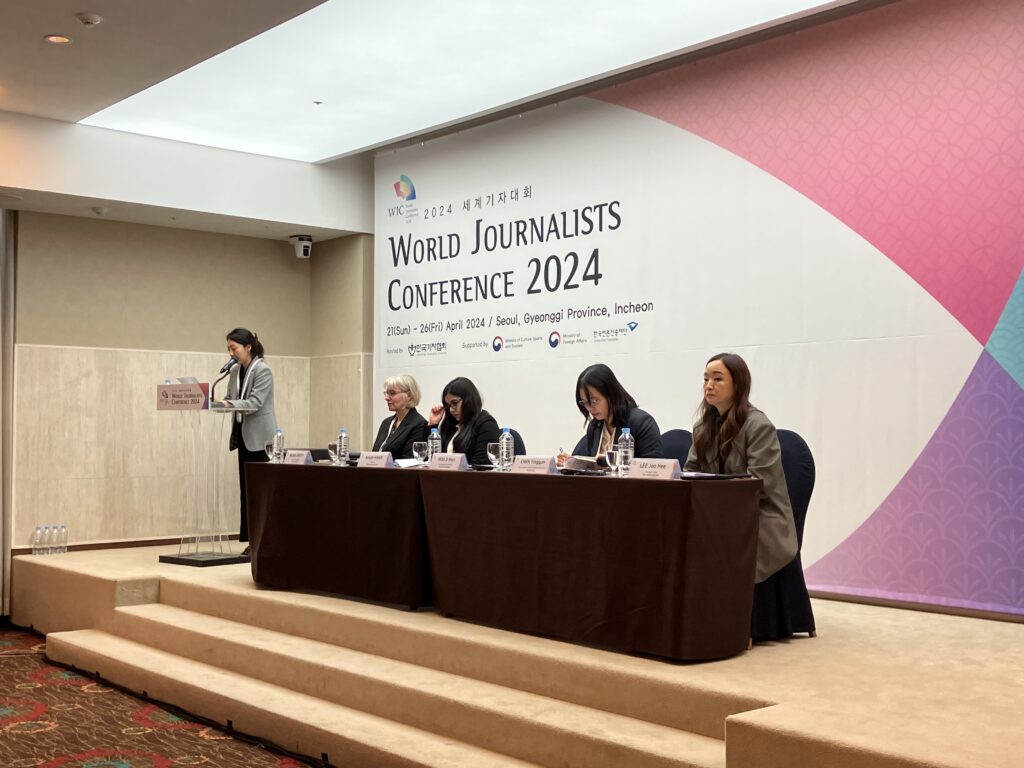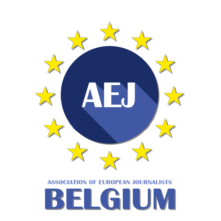By Elena Sánchez Nicolás

I had the opportunity to travel to South Korea last month to participate in the World Journalist Conference as a representative of AEJ Belgium. The event, organised by the Journalists Association of Korea and attended by around 60 journalists from 50 countries, focused on war journalism, the role of media in fostering peace, and the impact of artificial intelligence (AI) on the future of journalism.
With war raging in Gaza and Ukraine, and tensions rising in China and Iran, the world doesn’t seem to be paying much attention to what is happening on the Korean peninsula – and how their journalists are dealing with this situation. However, correspondents attending the conference signalled how important it is for the West to understand the China-Russia-North Korea partnership and its influence on world politics. As cautioned by Bruce Bennett, a defence researcher at RAND, these three nations could “convert Ukraine into a Russia-China-North Korea laboratory for examining and improving various weapons and tactics in actual warfare.” This matters not only for the US but also for the EU.
As I draft this article, news headlines report that North Korea has launched suspected short-range ballistic missiles off its east coast on Friday (17 May). This is, perhaps, nothing out of the ordinary as North Korea tends to ramp up its provocations before events in the West, such as the upcoming US elections. This is certainly no surprise for most South Koreans, who are used to the persistent alerts on their phones, signalling either new missile launches or the sudden disappearance of individuals. Notably, during my 10 days in the country, my phone rang with an alarm twice and displayed a message in Korean, which I, naturally, couldn’t understand — the first time sparked concern. But soon after I learned from colleagues living in Seoul that these alarms are often disabled by locals – due to their frequent occurrence, primarily related to reports of missing individuals. These are similar to alerts that people get on their phones in the US not to mention the signs pointing to bomb shelters and emergency paths leading to the metros, which also serve as protection from North Korea attacks.
When talking about war journalism and the media’s role in world peace, we tend to focus on seasoned journalists who lose their lives every year to try to bring stories from the ground. We saw it in Ukraine, and we also see it in Gaza, and many African countries. But we also often forget the situation of millions of journalists who cannot even travel to conflict areas to report on what is happening.
During the World Journalist Conference, one of the speakers explained how the restrictions set out by the South Korean government have limited Korean media’s coverage of the war in Ukraine. After the war broke out, the South Korean government designated Ukraine as a ‘no travel area’ – a travel ban system originally adopted to prevent journalists from being kidnapped by the Taliban in 2007. Nowadays, the travel ban extends beyond Ukraine to include Gaza, Iraq, Libya, Syria, Somalia, Yemen, and Afghanistan.
“The Korean government’s coverage restrictions are not only excessive but also highly problematic,” said Noh Ji Won, an international media reporter for Hankyoreh Media Korea, adding that such restrictions violate freedom of speech and restrict independent journalism.
“People only have the chance to build their own opinion on such issues [like wars and conflicts] with high-quality journalism, first-hand sources and reliable information,” she said, pointing out that “it is time for the Korean media to challenge the government’s excessive restrictions on war coverage”.
Disclaimer: This trip was organised and covered by the Journalists Association of Korea
